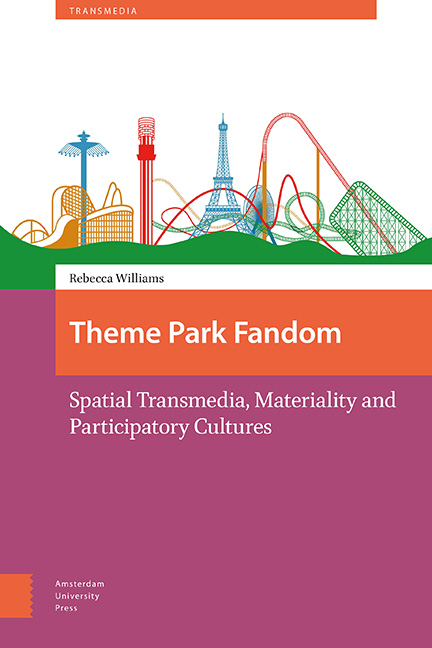Book contents
- Frontmatter
- Contents
- Acknowledgements
- 1 Introduction
- 2 Understanding the Contemporary Theme Park : Theming, Immersion and Fandom
- 3 Fandom, Brandom and Plandom : Haptic Fandom, Anticipatory Labour and Digital Knowledge
- 4 Extending the Haunted Mansion : Spatial Poaching, Participatory Narratives and Retrospective Transmedia
- 5 Of Mice and Minions : ‘Ani-embodiment’ and ‘Metonymic Celebrity’ in the Theme Park Character Encounter
- 6 Turkey Legs, Dole Whip and Duff : Consumables, Diegetic Paratexts and ‘Cult-Culinary’ Objects
- 7 Embodied Transmedia and Paratextual-Spatio Play : Consuming, Collecting and Costuming Theme Park Merchandise
- 8 Replacing and Remembering Rides : Ontological Security, Authenticity and Online Memorialization
- 9 Conclusion: Ways Forward for Theme Park and Fan Studies
- Index
- Frontmatter
- Contents
- Acknowledgements
- 1 Introduction
- 2 Understanding the Contemporary Theme Park : Theming, Immersion and Fandom
- 3 Fandom, Brandom and Plandom : Haptic Fandom, Anticipatory Labour and Digital Knowledge
- 4 Extending the Haunted Mansion : Spatial Poaching, Participatory Narratives and Retrospective Transmedia
- 5 Of Mice and Minions : ‘Ani-embodiment’ and ‘Metonymic Celebrity’ in the Theme Park Character Encounter
- 6 Turkey Legs, Dole Whip and Duff : Consumables, Diegetic Paratexts and ‘Cult-Culinary’ Objects
- 7 Embodied Transmedia and Paratextual-Spatio Play : Consuming, Collecting and Costuming Theme Park Merchandise
- 8 Replacing and Remembering Rides : Ontological Security, Authenticity and Online Memorialization
- 9 Conclusion: Ways Forward for Theme Park and Fan Studies
- Index
Summary
Abstract
This chapter argues for a move away from the notion of theme-park visitors as naive, controlled and duped into excessive consumption, and for approaches that take seriously the range of ways that theme park fans form active, reflective and pleasurable attachments to theme parks and their rides, attractions, and experiences. It argues that a Fan Studiescentric approach allows better understanding of how and why people become fans of theme parks and their attractions, and develop emotional and affective connections to these, whilst being acutely aware of the consumerist nature of the themed environment. Offering an overview of the chapters that follow, the chapter also provides a summary of the book's central arguments.
Keywords: theme park fandom, participatory cultures, transmedia, spatial transmedia, haptic fandom
Introduction
[T]heme parks represent extraordinary spatial and social forms, they offer some of the most basic needs, reflect deep and powerful emotions and cognitive modes, and present some of the most telling and controversial representations of the world. (Lukas 2008, pp. 7–8)
In February 2017 the American pop singer, Katy Perry released the first single from her album, ‘Prism’. Entitled ‘Chained to the Rhythm’, the track's video featured Perry visiting a highly stylized and futuristic fictional theme park featuring rollercoasters, swing rides and other attractions. The park, called Oblivia, represents the distractions of modern life including the taking of selfies, the instability of the contemporary housing market and, as represented by the park's star attraction, the endless treadmill or ‘hamster wheel’ of modern work. Whilst Perry's intent to make a broader political comment has been well documented (see Savage 2017), the fact that the setting and the aesthetics of the video highlight the location of the theme park is telling. According to Perry's vision, the theme park is a place of mindless distraction and conformity; somewhere that promises everything yet delivers nothing tangible or ‘real’, a site as ephemeral and insubstantial as the candyfloss consumed by those in the video.
A month later, in March 2017, a video entitled ‘Adult Disney fans are weird’ began circulating via the online comedy site College Humor.
- Type
- Chapter
- Information
- Theme Park FandomSpatial Transmedia, Materiality and Participatory Cultures, pp. 9 - 40Publisher: Amsterdam University PressPrint publication year: 2020



